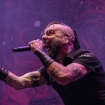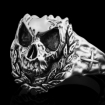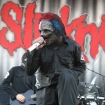This feature was originally published in April 2013.
"The concept is that there is no concept," Jesse Leach says with a laugh, describing the somewhat Seinfeld-ian plan for Killswitch Engage's new music video. The singer is driving from New York City to Boston, where he will be joining his Killswitch bandmates — guitarists Adam Dutkiewicz and Joel Stroetzel, bassist Mike D'Antonio, and drummer Justin Foley — to film the promotional clip for "In Due Time," the first single from their new and sixth studio album, Disarm the Descent. "It's just gonna be us hanging out with our actual crew, and setting up for the actual video shoot. Then by the end of the video, we're doing the video."
Dutkiewicz lays out the reasoning behind the non-concept: "We just hate videos a lot," he explains when Revolver catches up with the guitarist later. "The whole, 'We're a band and look at how cool we are. And check out how stupid this performance is — things are going to explode and there's going to be a girl involved, yeah!' We're not into that."
"This idea came up and we were like, 'That's perfect,'" Leach says. "We wanted to strip it down, with no B.S., no theatrics, no clichés. It's just us."
When it comes to Killswitch Engage, it should be noted that it has been many years since Leach has used words like "we" and "us" in conversation. The once, and now once-again, Killswitch frontman helped to found the Massachusetts-based band in the late '90s, and appeared on their first two albums, 2000's self-titled debut and the now-classic 2002 follow-up, Alive or Just Breathing. The latter record was a seminal entry in the then-burgeoning metalcore scene and helped to kickstart the so-called New Wave of American Heavy Metal movement that also included several other Massachusetts-bred acts, including Shadows Fall, All That Remains, and Unearth.
But just as Killswitch's star was rising in a serious way, Leach hastily jumped ship. "I was fighting pretty serious depression," he explains. "And I had just gotten married, and the band was on the road all the time. I couldn't deal with any of it. I was a broken, unconfident person." Leach says he received support from his bandmates — "I remember Adam and Joel taking me aside when we were doing our last interview together and saying, 'Hey, we love you, man. You do what you gotta do to get better'" — but there were also some hard feelings. "I think initially there were definitely some weird vibes between me and Mike D.," Leach says. "He was pretty pissed off, and rightly so. I don't blame the guy. I did a wimp move."
But if it seemed as if Leach's sudden exit might take the wind out of Killswitch's sails, what happened was quite the opposite. The band recruited former Blood Has Been Shed vocalist Howard Jones and cut 2004's The End of Heartache, which proved to be their breakthrough. The record climbed into the Top 40 on the Billboard album chart, and the title track was nominated in the Best Metal Performance category at the 2005 Grammy Awards. The band continued to ride a wave of success with subsequent albums As Daylight Dies and their 2009 self-titled disc, But then last year, Jones, in what seemed a bit like déjà vu, announced his own departure from Killswitch Engage, a decision that he came to after being diagnosed with type 2 diabetes, as well as the realization that, as he said in a publicly released statement, "my heart wasn't in it."
Though the announcement of Jones' departure came as a shock to Killswitch fans, it was hardly a surprise to his bandmates. "We could tell that Howard put on the sweatpants a little while ago," Dutkiewicz admits. "He was kind of not really there. We're still good friends, and we all still talk to him. But he needed to move on."
Enter — or, it should be said, re-enter — Jesse Leach. Since his initial split with the band, the singer had kept busy with his own projects, including the stoner-rock outfit Seemless, the hardcore-tinged The Empire Shall Fall, and the experimental Times of Grace, a collaboration with Dutkiewicz. He had also reestablished a musical relationship with Killswitch Engage, appearing onstage alongside Jones to sing the Alive or Just Breathing track "My Last Serenade" at the Roadrunner United concert in 2005, and performing as a stand-in at several gigs in 2010 after Jones took a leave of absence. But according to Dutkiewicz, when Jones left for good last year and the band began auditioning new singers, they didn't think to call Leach.
"Jesse doesn't really like to sing other people's lyrics," Dutkiewicz says. "So we were under the assumption that he wouldn't want to sing any of Howard's songs. Even when he filled in a few years back, he only sang on material that we had originally done when he was in the band. We had Phil [Labonte, All That Remains' frontman] do everything else. So when Howard left, Jesse's name definitely came up in discussions, but it was like, 'Yeah, but if we ask him to try out, it's probably going to be an issue. Because we kinda have to play some of the songs we've done over the past decade!'"
Dutkiewicz's assumptions about Leach proved correct, at least initially. Says the singer, "I called Adam, and my first thought was, 'Let's just do an Alive or Just Breathing reunion tour. It'd be fun, and you guys can figure out what you wanna do from there.' But the more we talked, it became apparent to me that that wasn't where their heads were at. They wanted someone who was going to commit to the band for the long term. So I sort of slept on that for 24 hours, and the next morning called management and said, 'I think it'd be cool if you put my name on the list. I want to audition.'"
Though the thought of Leach auditioning for a spot in Killswitch Engage seems odd, it made perfect sense to the singer. "I actually insisted on it, and the guys thought it was a good idea, too," he says. "It would have been arrogant to assume that just because I was in the band once, I could jump right back in. I also had to demonstrate that I could sing Howard's songs. I'm not a person who can go through the motions and be a 'cover singer,' for lack of a better term. So I spent a week obsessing over Howard's lyrics. And the moment I started to connect with them, I felt like I had it and I could give it a good shot."
According to Dutkiewicz, there were a handful of strong contenders for the frontman slot (though he confirms that Labonte was not among them — "We weren't breaking up other bands or anything"). But Leach proved his mettle. "He was great on Howard's stuff," Dutkiewicz says. "And of course, he sounded better than anyone else on his own songs." He laughs. "Jesse had a slight advantage there."
With Leach back on board, Killswitch did, in fact, embark on a 10th anniversary tour in support of Alive or Just Breathing. But they also set to work on a new album, using material that had been largely composed, at least instrumentally, prior to Jones' exit. "The guys had about 14 songs mapped out and completed musically," Leach says. "But Howard hadn't attempted to do anything with them. So I had free reign to go wherever I wanted with the music. They wrote a fast, vicious record, and I latched onto that."
Indeed, Disarm the Descent is, for lack of a better word, almost disarming in its ferocity. Its 12 tracks are among the most direct and hard-hitting in the band's catalog. Says Dutkiewicz, "We were feeling like our last record [2009's self-titled effort] was a little too slow for our tastes. So we got rid of a lot of the fat."
Vocally, Leach proved up to the task of matching the music's aggression, pushing his voice to the limit, and beyond. "I actually sang so hard during recording sessions that I damaged myself," Leach says. "There was a weekend where we were doing the songs 'You Don't Bleed for Me,' which is a pretty angry track, and 'New Awakening,' where you can hear me really going for it. And after that, I went to a vocal doctor and he told me I had hemorrhaged one of my vocal folds. And at first I was worried, but then I was like, 'You know what? That's awesome!' I saw it as a badge of honor."
At the very least, it's a testament to Leach's commitment to the music, and also, once again, to the band. "One thing I've always liked about Jesse is he's always had so much passion as an artist," Dutkiewicz says. "And he still has that. Of course, given our past history together, we had to talk some things out before he came back this time. But he assured us that his head is in a different place than it was the first time around. And it definitely is."
Leach confirms as much. "Being in Killswitch today is worlds apart from what it was 10 years ago," he says. "When we're out there on the road, I'm having a blast. I'm really good friends with these guys now, whereas back then we were new friends, and really more like musical associates because we were from the same scene. So it's a totally different vibe. And sure, I still miss home and my wife when we're touring. But it's one of those things where I'm doing what I love, so I can deal with it."
Which is not to say that being a member of Killswitch Engage doesn't come with its challenges. Only today, those challenges are of a different sort. "If anything, one of the things I've actually found myself struggling with a little bit is the fact that the band now functions on such a bigger level than when we were first starting out," Leach says. "I'm not used to people wanting autographs, or waiting around outside the venue hours before we arrive or in front of the tour bus after a show to meet us.
"So I'm definitely not complaining, but it freaks me out a little bit," he says with a laugh. "But it's cool. It's a good problem to have, you know?"












